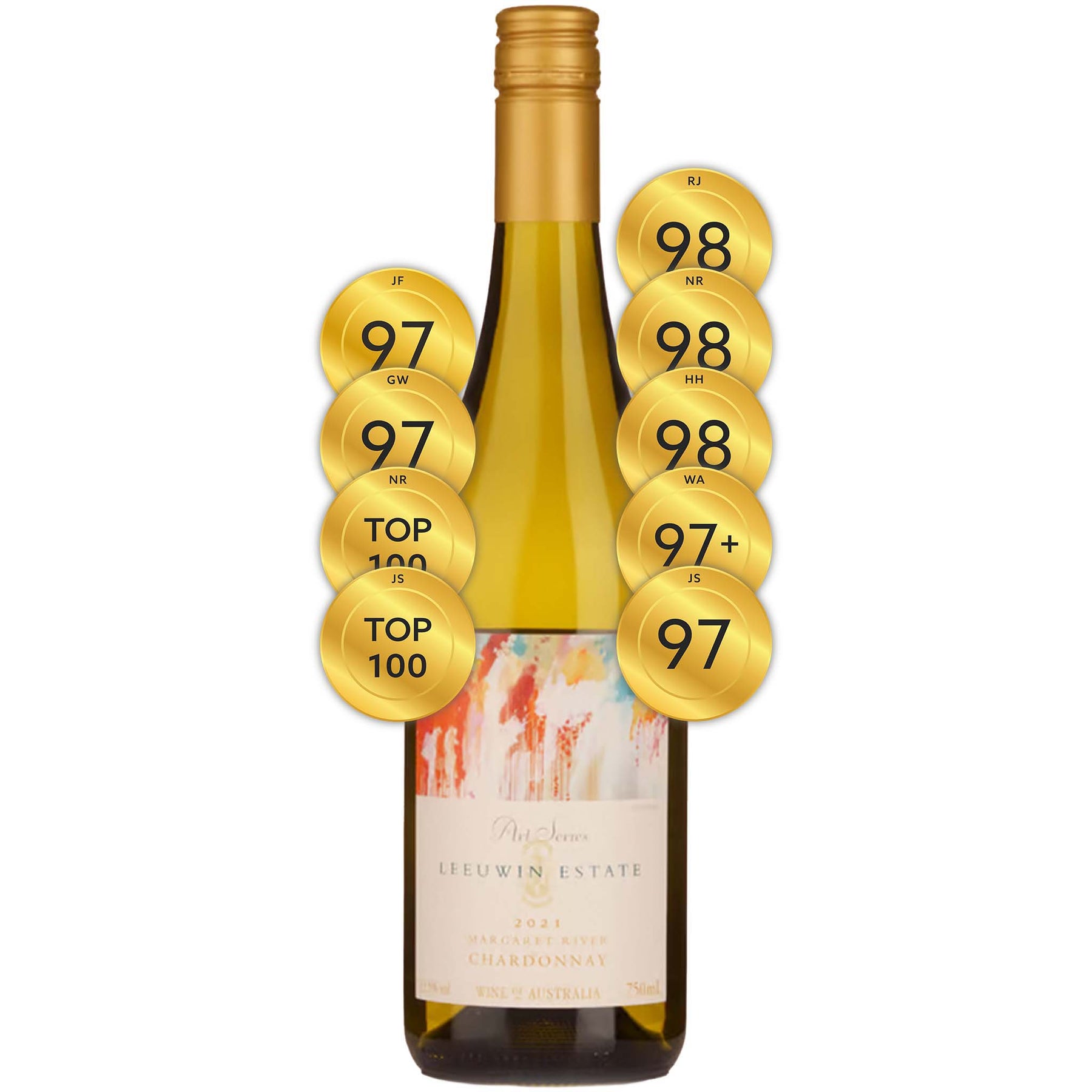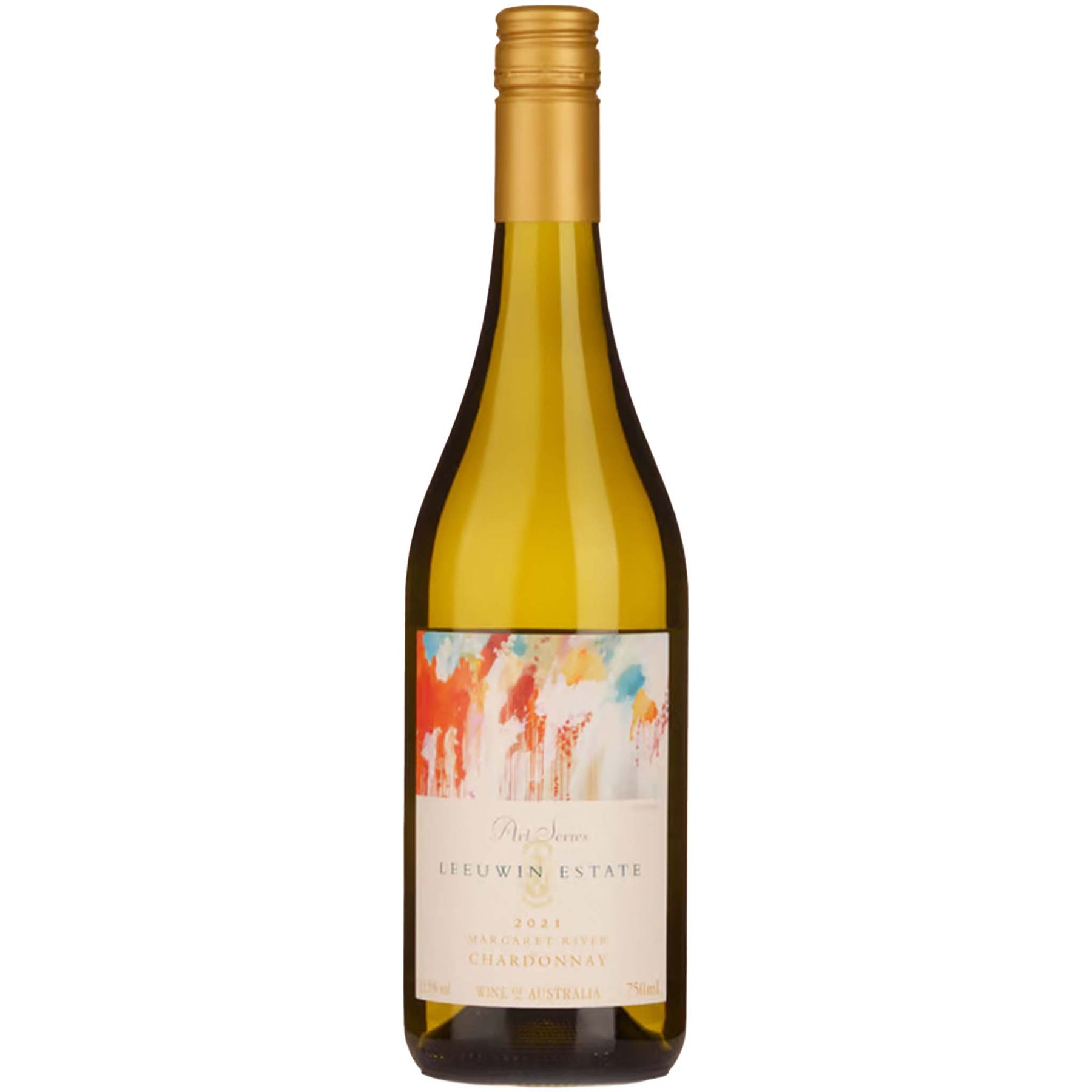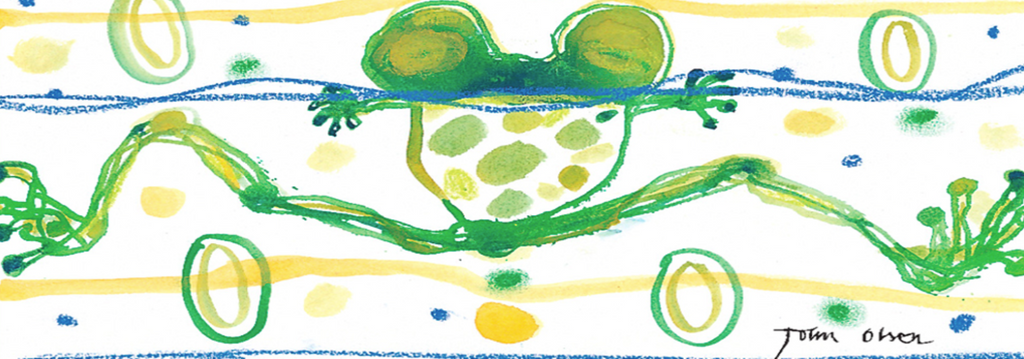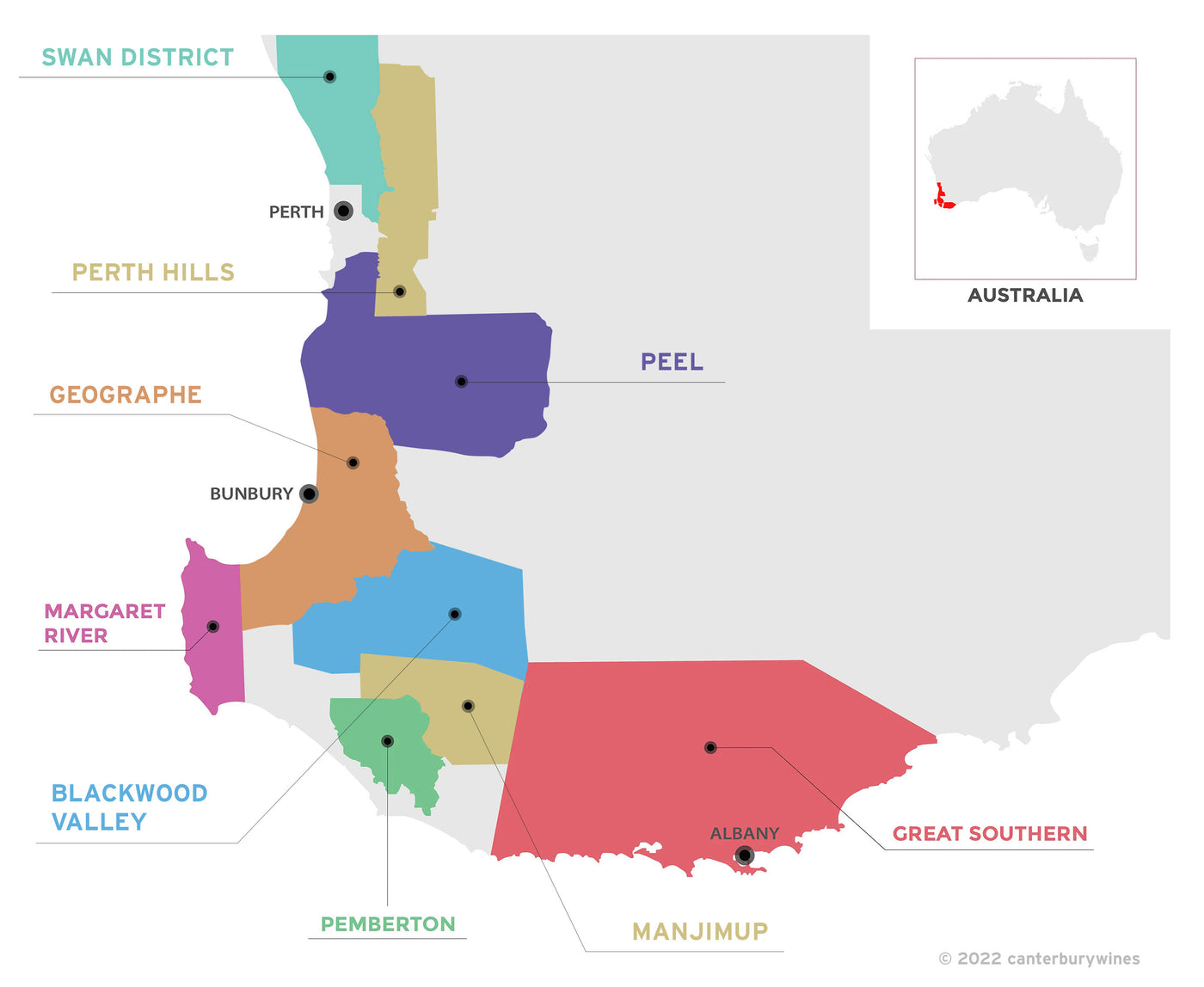

Leeuwin Estate Art Series Chardonnay 2021
Style: White Wine
Closure: Screwcap
Leeuwin Estate Art Series Chardonnay 2021
Warehouse
34 Redland Drive
Vermont VIC 3133
Australia
Critic Score: 98
Alcohol: 13.5%
Size: 750 ml
Drink by: 2040
James Suckling Top 100 Wines of Australia 2024
Nick Ryan Top 100 Wines of 2024
"I’ve gone on record more times than I care to count saying the Leeuwin Art Series is Australia’s greatest chardonnay." James Halliday
Leeuwin Estate Art Series Chardonnay needs no introduction. It is an icon of Australian wine and is one of Langton's Heritage Five which celebrates Australia's most exceptional and ground-breaking wines - the other four being Penfolds Grange, Henschke Hill of Grace, Mount Mary Quintet and Wendouree Shiraz. It is often compared favourably with great White Burgundies.
"The palate is brisk and bright with vibrant acidity and intense grapefruit/lemon flavours that persist the full length of the very long palate. Superb vitality and balance. It promises to reward cellaring too. Tremendously concentrated and compact, with extreme drive and massive persistence, it positively vibrates with energy. Very cellarworthy, too." Huon Hooke
The Art Series Chardonnay is sourced primarily from the 1976-planted Block 20 and supplemented with fruit from the 1978-planted Block 22. The quality of the vineyard is well recognised and remains the backbone of the Art Series Chardonnay. The vineyard blocks are planted to the Gingin clone on a series of rolling hills facing all directions.
"Energetic and well poised, an array of fresh lime and nashi pear is laced throughout. The palate is ethereal, mineral and defined with a presence of natural acidity. There is an enticing element of saline, wet stone and phyllitic characteristic that weaves within. The shape and frame on the palate is present and focussed with effortless length." Leeuwin Estate
Expert reviews
"One of the icons of Australian wine, and in peak form. There’s always been a sense of latent power to Leeuwin chardonnays – it’s not necessarily in your face, but you just feel it’s there. This has white peaches and nectarines, some enlivening lime zest, grilled cashews and spice. The layers reveal themselves the longer you spend with it – a sign of real class. The legend grows." Nick Ryan, The Weekend Australian - 98 points and Top 100 Wines of 2024
"Light straw colour with a reserved lemon/grapefruit aroma, fresh and penetrating, the palate brisk and bright with vibrant acidity and intense grapefruit/lemon flavours that persist the full length of the very long palate. Superb vitality and balance. It promises to reward cellaring too. Tremendously concentrated and compact, with extreme drive and massive persistence, it positively vibrates with energy. Very cellarworthy, too. Drink: 2024–2036." Huon Hooke, The Real Review - 98 points
"Remarkably complex aromas of dominant stone fruit like nectarine with less of the pear and cut lime character you expect. An intense and powerful wine with a distinctive chalky limestone influence on the palate. Lacks the super intensity of the 2020 yet it has great length and focus. Continues the subtle move to Burgundian styles. This is one of the most delicate of Arft Series chardies. Elements of the 2017 yet there is more power and intensity within its tight frame. Has slightly more phenolic character. The minerally cracked seashell character is clearly evident here. It is a pure with an almost shimmering acidity and precision through to the long finish. One of the more individual of the Leeuwin chardonnays to date. Cellar: 25 years." Ray Jordan, Ray Jordan Wine - 98 points
"The 2021 Art Series Chardonnay leads with a distinctly floral nose: jasmine and white garden rose, wisteria and lemon blossom. The season was a challenging one in Margaret River, defined by the rainfall, which was constant. The temperatures were modest (not cool, as plenty of rain might suggest),and given that the region is so diverse in terms of distances between vineyard areas, this created quite a patchwork of outcomes for producers. On the palate, the wine is powerful and savory—it leans heavily on exotic dry spice and cracked honeycomb, with hints of salted butter on fresh white bread, beeswax and salted pink grapefruit. Stylistically, it is not dissimilar to the 2017; however, the dovetailing of acid and fruit feels seamless and well matched here. The wine is piercing and structural, tightly coiled and almost rigid, in the best of ways. It's an impressive wine, one that, at this stage of its life, is defined by its penetrating acid line." Erin Larkin, Wine Advocate - 97+ points
"Extremely complex and classy on the nose with aromas of lemon peel, flint, nectarines, sea salt and minerals. The palate is tightly wound with high-tension acidity, generous mouthfeel and an underlying power, showing notes of lime curd, mandarin pith, orange blossoms, baking spices and gunsmoke. Very complete and made for the ages. Excellent. Drink or hold. Crown cap." James Suckling, JamesSuckling.com - 97 points and Top 100 Wines of Australia 2024
"There’s always an anticipation when a new vintage arrives. This doesn’t disappoint – it’s archetypal Art Series: powerful, rich and layered with flavour from stone fruit, pink grapefruit and Meyer lemon to a touch of mandarin. The palate builds with creamy lees, oak spice and some phenolics – the oak is superbly integrated, and pure acidity leads this to a persistent finish. Impressive as always. Drink by 2034." Jane Faulkner, Halliday Wine Companion - 97 points
"Pear, lime, grapefruit, floral too, with a distinct mint/aniseed top note, backed with discreet spicy cinnamon/ginger oak. It’s fresh and lively, quite saline too, flinty and chalky, a honey ginger drink character in the mix, along with a cucumber coolness and biscuit spices, a whole lot of presence and power here, delivered in a kind of understated, but confident way. The finish is very long, and refreshing. Gee, this is good wine. It ripples through the mouth like a flat white stone pitched across a cool lake. That’s an image for you, and I’ll leave you with that. Drink: 2025 - 2040+." Gary Walsh, The Wine Front - 97 points
Awards
James Suckling Top 100 Wines of Australia 2024
Nick Ryan Top 100 Wines of 2024
The winery

In 1969, Denis and Tricia Horgan purchased a farm and plumbing business in Margaret River that they would eventually transform into Leeuwin Estate, one of Australia's most iconic wineries. At the time they had little interest in wine or plumbing (they sold the business), but in 1972 they met legendary Napa Valley winemaker, Robert Mondavi, who wanted to purchase their farm to plant vineyards. The farm was not for sale, but with Mondavi acting as consultant and mentor, they planted vineyards with the dream of becoming a world-class producer of premium wine.
A nursery was planted in 1974, the vineyards were planted over a five-year period from 1975 and Leeuwin released its first commercial vintage in 1979. The Leeuwin Estate vineyards are planted to Chardonnay, Cabernet Sauvignon, Riesling, Sauvignon Blanc and Shiraz, but it is the Chardonnay and to a lesser extent the Cabernet that are the stars of the portfolio. Langton's classifies Leeuwin Estate Art Series Chardonnay as 'Exceptional' and one of the Heritage Five which celebrates Australia's most iconic, exceptional and ground-breaking wines - the other four are Penfolds Grange, Henschke Hill of Grace, Mount Mary Quintet and Wendouree Shiraz.
Leeuwin Estate releases its wines under three labels, the Art Series, Prelude Vineyards and Siblings. The Art Series range was created in 1980 and features Australian artwork on the labels.
Denis and Tricia Horgan continue their involvement in Leeuwin Estate, but today it is their two eldest children, son Justin Horgan and daughter Simone Furlong, who run the business as joint chief executives.
"I fell into the wine industry because Mondavi wanted to buy the land; I thank God that we didn't sell." Denis Horgan

Art series labels

The Art Series range was created in 1980 and features Australian artwork on the labels.
"I had developed an interest in Australian art in the early days. During a trip to Europe I was invited to meet Baroness Philippine de Rothschild at the Chateau Mouton-Rothschild wine estate in Bordeaux. The winemaker showed me around the winery and art gallery before having lunch with the Baroness.
I was so impressed with the way art had been integrated into the business that I asked Baroness Philippine if she would mind if we used Australian Artwork on our labels. She thought that was a great idea and said, "Go ahead".
So we created the 'Art Series' range in 1980 to define our most opulent and age-worthy wines from each vintage. The first label carried a painting of our region's famous 'Caves Road' by Robert Juniper. We now have over 150 paintings from Australia's leading contemporary artists in our collection. We display the original artworks in the winery art gallery." Denis Horgan
The collection now comprises over 150 paintings and features artworks from artists including John Olsen, Arthur Boyd, Sir Sidney Nolan, Lloyd Rees, Albert Tucker, Fred Williams, Robert Juniper, Clifton Pugh and Imants Tillers. The only work not part of the Estate's own collection is Sir Arthur Streeton's Golden Summer, which was kindly offered by its then owner for use on a special Museum Release of the 1987 Art Series Cabernet Sauvignon before moving to its new home at the National Gallery.
Many of the paintings and sculptures were specifically commissioned. Others were discovered in exhibitions around Australia and the artists approached for copyright permission to be reproduced as part of the label series. The first painting commissioned was of Caves Road by Robert Juniper for the 1980 Art Series Chardonnay. John Olsen was approached to paint the first artwork to be used on the Art Series Riesling. He responded with the creation of four works entitled “Frogs in Riesling”. These paintings were so irresistible that the decision was made to purchase all four and all have been used, in a random pattern, on Art Series Riesling labels ever since. This makes the Riesling unique, as for the labels of all other wines, a new work is commissioned each year.

Sir Sidney Nolan, when approached at the beginning of the series, advised he was not a graphic artist and did not paint for wine labels. He was also a red wine buff and was sent two unlabelled bottles of the 1982 Cabernet Sauvignon – one of Leeuwin's best vintages. He responded that for this wine he would happily provide a painting. This resulted in his Dolphin Rock appearing on the label.
With the high calibre of the artists consenting to appear on the labels, it is no longer a challenge convincing leading artists to be part of this collection. Eventually, as the collection builds, it is hoped to tour it in its own right. Some works have been lent from time to time but most are on display in the Leeuwin Estate Art Gallery.
The concerts

"As one of the world's most isolated wine regions, we wanted to be creative in generating reasons for visitors to come and discover Margaret River and our wines.
Our winery overlooks a meadow surrounded by a forest of tall karri trees, creating a beautiful natural amphitheatre. So in 1985 we wrote to the West Australian Symphony Orchestra, the local Ballet Company and the Opera Company inviting them to consider coming down and doing a concert. The idea of alfresco performances in the bush was extremely novel at the time and we didn't get much interest from any of them.
The then Director of The Festival of Perth, David Blenkinsopp, approached us about that time, asking if we would underwrite the visit to Australia of the London Philharmonic Orchestra, something that somewhat shocked us at the time, huge costs, logistics and all of that – no was the answer, unless they would be prepared to perform in our vineyard.
He went off to London to organise the tour and said he'd talk to the LPO and let me know. To my surprise he came back and said they'd love to perform at Leeuwin, as long as we underwrote the whole Australian tour. Trish thought I was mad, in fact everybody I know thought I was mad, but I said yes!
Funnily enough it was a bit like the wine, we didn't know that much about music and certainly nothing about being concert promoters, however we thought the London Philharmonic Orchestra was a pretty good 'band' to start our concerts with! They really might be worth the risk and we needed to generate a profile for our wine business in a creative way.
So 100+ members of The London Philharmonic Orchestra travelled all the way to Margaret River, we built a stage, did some creative things entertainment wise and all had a fantastic night. The concert was a sell-out; we even had to turn away 500. It made front page news, described as “The most extraordinary concert ever held in Australia."
Our wines were successfully launched nationally at functions held off the back of the concerts throughout Australia – it proved to be a highly successful promotion.
The impact of that first concert guaranteed the future success of our concerts. Whilst it cost a fortune in our underwriting of the total Australian tour it was a highly successful launch pad to promote Leeuwin Estate to all the right people at home and Eastern Australia.
That first Leeuwin Concert was so successful that we continued the relationship with the Festival of Perth for another two years, featuring other international orchestras. Then we thought that we needed to do something different and presented Ray Charles. The new format proved to be even more successful so we decided to stick to that format for a while – 32 years later we have presented an eclectic array of the world's leading musicians at Leeuwin, from Sting to James Taylor, Carole King and Dame Kiri Te Kanawa." Denis Horgan
Text taken from Milton Wordley's article 'People of Wine', https://winetenquestions.com.au/

Western Australia
Western Australia is home to more than 400 wineries across nine vast and extraordinary wine regions which are almost entirely concentrated in the south-west and great southern land divisions of the State. The regions are Blackwood Valley, Geographe, Great Southern, Peel, Pemberton, Manjimup, Margaret River and Swan District.
The oldest region is the Swan Valley, the best known both nationally and internationally is Margaret River and the largest is Great Southern. The Great Southern region is further divided into the five subregions of Albany, Denmark, Frankland River, Mount Barker and Porongurup.
The history of wine production in Western Australia dates back to 1840 with the establishment of Sandalford in the Swan Valley region. The recognition of the fine wine possibilities started to be realised after the establishment of the Margaret River Region in 1967, which has become renowned for its high quality Chardonnay and Cabernet Sauvignon. The other regions produce a diverse range of regionally distinct wines, from stunning Rieslings and evocative Shiraz, to a range of unique Cabernet Sauvignon blends.


